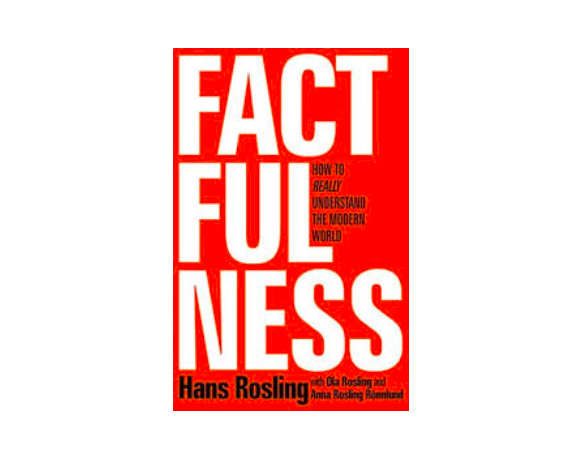Hans Rosling died of pancreatic cancer in February 2017, aged 68, so he did not live long enough to see his book Factfulness published in 2018 and reach bestseller status a short time after. Rosling was a physician, working in Africa in WHO projects, an academic and a well-known speaker, always trying to support the cause for a better world with hard data and the bubble charts he would get to be known for.
He was helped on this endeavour by his son Ola and his daughter-in-law Anna, who brought to this partnership their know-how in software, data analysis and chart design. Together they founded the Gapminder Foundation, they launched the Trendalyzer software and prepared numerous speeches and TED talks, all of them with the aim of bringing more clarity and facts about what is really happening today in the world. They got together to work on a project one last time, while Hans was already suffering the cancer who would finally end his life.
The result is Factfulness, an insightful and illuminating book, so much so that Rosling´s friend, Bill Gates, gave 4 million free digital copies to American school children and recommended everyone to read it. Factfulness is indeed a book that everyone, not only school children, should read.
The premise of the book is quite simple. There are many things about the world, important things, that most of us get wrong, and we have them wrong because we respond to 10 instincts that make us overdramatize the world around us. These instincts had an evolutionary purpose and helped us survive in a more dangerous environment, but they are limiting us in today’s world.
We seem to have a factually incorrect view of the world, regardless of whether you are a university student, a business or political leader attending a World Economic Forum in Davos, a Nobel prize winner or a high-ranking UN functionary. These are the types of audiences that during his long career as speaker Rosling addressed, always asking the same questions about the world, questions which most people invariably got wrong.
The book starts with a test with thirteen questions set with multiple choice answers. These are some of the questions:
“What is the life expectancy of the world today?
- 50 years
- 60 years
- 70 years”
“How many people in the world have some access to electricity?
- 20 percent
- 50 percent
- 80 percent”
They look simple enough, don’t they? If you do the test and if you are like the big majority of the population, you will probably get most of them wrong, utterly wrong, but don’t worry, you are in illustrious company. As I said above, also Nobel prize laureates, Prime Ministers or CEOs get them wrong, and the number of correct answers is usually below what you would get if you answered them randomly.
Rosling makes a very good analogy about this. If you went to the zoo, painted A, B and C in bananas and asked the chimpanzees of the zoo to choose a banana after you asked each of the thirteen questions, they would get more right answers than if you asked the same questions to a room full of intelligent people. Something is amiss here, and Rosling has the answer.
He and his co-authors have identified ten instincts and biases that make us answer these questions wrong, worse than random and worse than some chimpanzees, and they devote one chapter to explaining each of them.
For example, one of them is the Negativity Instinct, or how you should always expect bad news from the media, as good news doesn’t seem to sell as much. This distorts our view of reality and makes us believe that things are always worse than what they really are.
If we only see hunger-stricken children, hurricane victims, devastated war zones and terrorist attacks in our evening news it is normal to assume that the world is getting worse, not better. As Rosling tells us, there are still many pockets of bad in the world, but the world is getting better. It can be bad but getting better.
There is also the Straight Line Instinct, whereby we see a line on a chart and we directly extrapolate ad infinitum, not realising that in most charts the lines may and usually bend, making our assumptions wrong.

For each of these instincts, Rosling uses one or several of the initial thirteen questions to illustrate his point, tells stories and anecdotes from his colourful life as a development worker and doctor in rural Africa, displays many easy to read charts and, he provides facts, plenty of them, as this is basically the main point of the book: the only way to combat ignorance and overcome these limiting instincts and biases is to arm ourselves with more facts about the world. We should practice more factfulness.
The result is an easy to read and fun book that makes you think and learn, which is what good books should be about. I read somewhere that great books are those that change you and change the view you have of the world, and I think Factfulness does that, or at least it did with me.
Some critics have said that Rosling is overly optimistic and he has hectored statistics to paint an unnecessarily rose-tainted view of reality. This might be true, but the facts are there. There are still many things wrong in the world, but some or many of them have improved and are getting better.
Even if some of the statistics that didn’t fit with their narrative have been omitted, the main message of the book is still valid: don’t assume everything you hear or see is true and look for the facts. It is a welcome call for a more critical thinking than what most of us exhibit in this world of deep-fakes, fake news and post-truth.
I must admit that the only thing I did not like about the book is the condescending and patronizing tone Rosling often took in some passages, in particular when he talked about how chimpanzees could get more correct answers than us and how we could all be so stupid. I think this has more to do with myself though, as I don’t really like being treated as a stupid and this really bothers me. After a while you get used to it and it is a rather effective tone as a call-for-action resource, as in “what are you waiting for you idiots! These chimpanzees are smarter than you!” It sure worked for me.
By now many of you will be asking yourselves, why is this book reviewed in the Humane Future of Work? I think it is very relevant and some of its messages resonate very well with the aims of this website.
We are trying to build a better, more humane Future of Work here, but for that we need to understand the real facts of how the world works today. We also need to understand the biases and instincts that will impede us seeing well what is happening and perceiving reality as it is. Last but not least, Factfulness shows us that there is hope, that the world is not as terrible as we think, that there are bad things but we are improving and that possibly the future won’t be as bad as some people think if we work on making it better.
